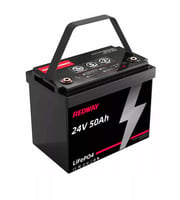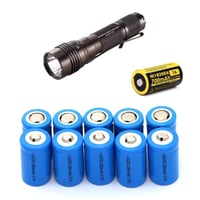In the fast-paced world of logistics, every second counts. Downtime due to sluggish forklifts or...
Comprehensive Guide and Benefits Of 48V 100Ah Lithium Battery 8D
Introduction
Lithium batteries have revolutionized the way we think about energy storage and power management. Among the various options available, the 48V 100Ah lithium battery 8D stands out as a powerful and efficient choice for numerous applications. In this article, we'll dive deep into what makes this battery special, its specifications, advantages, applications, and much more.

Understanding Lithium Batteries
What are Lithium Batteries?
Lithium batteries are rechargeable batteries that use lithium ions as the primary component of their electrochemistry. These batteries are known for their high energy density, long life, and efficiency.
Types of Lithium Batteries
There are several types of lithium batteries, including lithium-ion (Li-ion), lithium iron phosphate (LiFePO4), and lithium polymer (Li-Po). Each type has its unique characteristics and applications.
Why Choose Lithium over Other Battery Types?
Lithium batteries offer numerous benefits over traditional lead-acid and nickel-cadmium batteries. They are lighter, have a higher energy density, and require less maintenance. Additionally, they have a longer lifespan and faster charging capabilities.
Specifications of 48V 100Ah Lithium Battery 8D
Voltage and Capacity Explained
The 48V rating indicates the battery's voltage, while the 100Ah rating signifies its capacity. This combination provides a significant amount of energy, suitable for various demanding applications.
Physical Dimensions and Weight
Typically, a 48V 100Ah lithium battery 8D is compact and lightweight compared to its lead-acid counterparts. These dimensions make it easier to handle and install in tight spaces.
Cycle Life and Durability
One of the key advantages of lithium batteries is their extended cycle life. A 48V 100Ah lithium battery can offer thousands of charge-discharge cycles, ensuring long-term reliability and performance.
Charging and Discharging Rates
These batteries support high charging and discharging rates, making them ideal for applications requiring rapid energy replenishment and high power output.
Advantages of 48V 100Ah Lithium Battery 8D
High Energy Density
Lithium batteries pack a lot of power into a small footprint. This high energy density translates to longer run times and more efficient energy storage.
Longevity and Cycle Life
With proper care, a 48V 100Ah lithium battery can last for many years, providing thousands of cycles. This longevity makes them a cost-effective solution over time.
Lightweight and Compact Design
Compared to traditional batteries, lithium batteries are significantly lighter. This feature is particularly beneficial for applications like electric vehicles and portable power systems.
Low Maintenance Requirements
Lithium batteries are virtually maintenance-free, eliminating the need for regular watering or equalizing charges required by lead-acid batteries.
Applications of 48V 100Ah Lithium Battery 8D
Renewable Energy Storage
These batteries are perfect for storing energy generated by solar panels or wind turbines, providing a reliable power source for homes and businesses.
Electric Vehicles
The high energy density and lightweight nature of lithium batteries make them ideal for electric cars, bikes, and other transportation methods.
Marine Applications
Boats and yachts benefit from the long cycle life and robustness of lithium batteries, ensuring reliable power for navigation and onboard systems.
Off-Grid Power Systems
For remote locations without access to the grid, a 48V 100Ah lithium battery provides a dependable energy storage solution, ensuring continuous power availability.
Installation and Maintenance Tips
Proper Installation Techniques
Ensure that the battery is installed in a well-ventilated area and secured properly to prevent movement. Use appropriate wiring and connectors to handle the high currents.
Safety Precautions
While lithium batteries are generally safe, it's crucial to follow manufacturer guidelines. Avoid exposing the battery to extreme temperatures, and handle it carefully to prevent damage.
Maintenance Best Practices
Regularly check the battery's state of charge and ensure it is not discharged below the recommended level. Clean the terminals and connections periodically to maintain optimal performance.
Comparing 48V 100Ah Lithium Battery 8D with Other Batteries
Lead-Acid Batteries
Lead-acid batteries are cheaper initially but have a shorter lifespan and lower energy density. They also require regular maintenance, making them less convenient.
Nickel-Cadmium Batteries
Nickel-cadmium batteries have good performance but suffer from memory effect, which reduces their usable capacity over time. They are also heavier and less environmentally friendly.
Other Lithium Battery Models
Different lithium battery models vary in performance, cost, and application suitability. The 48V 100Ah lithium battery 8D is a balanced choice offering high capacity and durability.
Cost Considerations
Initial Investment
Lithium batteries have a higher upfront cost compared to traditional batteries. However, their long lifespan and low maintenance needs justify the initial investment.
Long-Term Cost Efficiency
Over time, the lower maintenance costs and longer lifespan of lithium batteries result in significant savings, making them a cost-effective choice in the long run.
Availability and Sourcing
These batteries are widely available from various manufacturers. Ensure you purchase from reputable suppliers to guarantee quality and reliability.
Environmental Impact
Sustainability of Lithium Batteries
Lithium batteries are more environmentally friendly than lead-acid batteries. They have a lower carbon footprint and are more energy-efficient.
Recycling and Disposal
Proper recycling and disposal of lithium batteries are essential to minimize environmental impact. Many manufacturers offer recycling programs to handle used batteries responsibly.
Future Trends in Lithium Battery Technology
Technological Advancements
Ongoing research and development are leading to improvements in energy density, charging speed, and overall performance of lithium batteries.
Market Growth and Demand
The demand for lithium batteries is growing rapidly, driven by the rise of electric vehicles, renewable energy storage, and portable electronics.
Innovations on the Horizon
Future innovations may include solid-state lithium batteries, which offer higher energy densities and improved safety, further enhancing the capabilities of these energy storage solutions.
Customer Reviews and Feedback
Common Praises
Customers often praise the long life, high performance, and reliability of the 48V 100Ah lithium battery. Many appreciate the low maintenance and ease of use.
Typical Concerns
Some concerns include the higher upfront cost and the need for proper disposal. However, these are often outweighed by the battery's benefits.
Real-World Performance Insights
Real-world usage confirms that these batteries deliver on their promises, providing dependable power for a wide range of applications from home energy storage to electric vehicles.
Conclusion
The 48V 100Ah lithium battery 8D is a powerful, efficient, and reliable energy storage solution. Its high energy density, long lifespan, and versatility make it suitable for numerous applications, from renewable energy systems to electric vehicles. Despite the higher initial cost, the long-term benefits and cost savings make it a worthwhile investment. As technology advances, these batteries will only become more efficient and widespread, solidifying their place in the future of energy storage.
FAQs
How long does a 48V 100Ah lithium battery last?
A 48V 100Ah lithium battery can last for several years, often providing over 2,000 charge-discharge cycles with proper care and maintenance.
Is a 48V 100Ah lithium battery suitable for off-grid systems?
Yes, its high capacity and reliability make it an excellent choice for off-grid power systems, ensuring continuous power availability.
What is the charging time for a 48V 100Ah lithium battery?
Charging time can vary, but typically it takes around 4-6 hours with an appropriate charger, depending on the charging rate and efficiency.
Can I use a 48V 100Ah lithium battery for my electric vehicle?
Absolutely! Its high energy density and lightweight design make it ideal for electric vehicles, providing long range and efficient power delivery.
Are there any safety concerns with using lithium batteries?
While generally safe, it's important to follow manufacturer guidelines, avoid extreme temperatures, and handle the battery with care to prevent damage.


